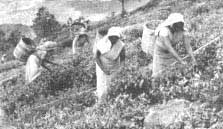Turning over a tea leaf
 A LARGE number of tea gardens in Darjeeling have switched over to organic tea. No inorganic fertilisers, pesticides and wcedicides are used. The planters only use bio-compost, biomass-based mulching is being used as fertilisers. Similarly, only neem-based pesticides and weedicides like Neerrigold and Neemazol are used. Organic tea is meant only for export.
A LARGE number of tea gardens in Darjeeling have switched over to organic tea. No inorganic fertilisers, pesticides and wcedicides are used. The planters only use bio-compost, biomass-based mulching is being used as fertilisers. Similarly, only neem-based pesticides and weedicides like Neerrigold and Neemazol are used. Organic tea is meant only for export.
More than 80 per cent of Darjeeling tea is exported. Germany, Japan and Britain being the main buyers. The remaining 20 per cent of Darjeeling tea is consumed in the domestic market. In the recent past, some consignments of Darjeeling tea have been rejected by Germany, because the maximum residue limit (MRL) of certain chemicals was beyond the prescribed limits. Germany, USA and UK have laid down some norms regarding MRL.
The norms and conditions for organic tea have been laid down and it is certified by the Institute of Marketocology in Germany. For a conventional tea producing garden to become organic, it has to stop using fertilisers, pesticides and weedicides for three years. After that the garden is inspected by the representative of the Institute of Marketocology and is certified as an organic garden. According to R K Dixit, president of Teesta Valley tea garden, with most of the Darjeeling gardens going organic, the production of Darjeeling tea is decreasing.
The pricing of Darjeeling organic tea depends on the international buyers. According to Kalyan Mukherjee of Goodricke Tea, "the tea is the buyers market and not the sellers market". Tea is sold directly to the international buyers as well as indirectly through auction market.
Darjeeling gardens are now producing the finest organic tea in the world but at the cost of the reduction in the crop yield. The prices, too are not increasing commensurately, although occasionally a certain amount of tea from some gardens has fetched phenomenal or fancy prices, the recent one being nearly Rs 28,000 per kg. The Castleton tea garden (Goodricke company) in 1991 produced tea which fetched the price of Rs 13,001 per kg in the auction. It is hoped that the 'organic champagne tea' will command a good price.
Related Content
- Interconnected disaster risks: Turning over a new leaf (2025 report)
- 'Transformed' Chambal dacoits join fight against deforestation
- India State of the Environment Report : The Monthly Overview, September 2013
- Kerala tea estate turns a new leaf with mid-day meal scheme
- Forest fires aid in the spread of mercury in soil
- CP-Dwarka trial run begins today
